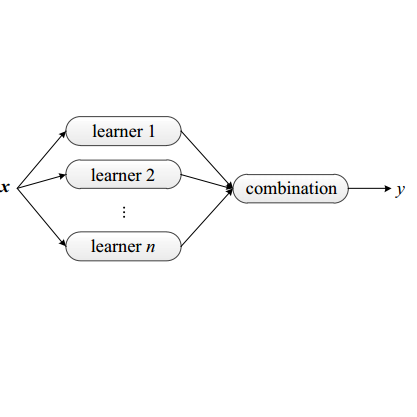Methods for building fair predictors often involve tradeoffs between fairness and accuracy and between different fairness criteria, but the nature of these tradeoffs varies. Recent work seeks to characterize these tradeoffs in specific problem settings, but these methods often do not accommodate users who wish to improve the fairness of an existing benchmark model without sacrificing accuracy, or vice versa. These results are also typically restricted to observable accuracy and fairness criteria. We develop a flexible framework for fair ensemble learning that allows users to efficiently explore the fairness-accuracy space or to improve the fairness or accuracy of a benchmark model. Our framework can simultaneously target multiple observable or counterfactual fairness criteria, and it enables users to combine a large number of previously trained and newly trained predictors. We provide theoretical guarantees that our estimators converge at fast rates. We apply our method on both simulated and real data, with respect to both observable and counterfactual accuracy and fairness criteria. We show that, surprisingly, multiple unfairness measures can sometimes be minimized simultaneously with little impact on accuracy, relative to unconstrained predictors or existing benchmark models.
翻译:建立公平预测器的方法往往涉及公平与准确之间的取舍,而不同的公平标准之间的取舍,但这种取舍的性质各不相同。最近的工作力求在特定问题环境下对这些取舍加以定性,但这些方法往往无法容纳希望提高现有基准模型公平性而不牺牲准确性或反之亦然的用户。这些结果通常也局限于可观察的准确性和公平性标准。我们为公平共同学习制定了一个灵活的框架,使用户能够有效地探索公平与准确性空间或提高基准模型的公平性或准确性。我们的框架可以同时针对多种可观测或反事实的公平性标准,使用户能够将大量以前受过训练和刚受过训练的预测器组合起来。我们提供了理论保证,让我们的估算器能够以快速的速度聚集起来。我们在模拟数据和真实数据上都应用了我们的方法,既针对可观察性标准,又针对相反的准确性和公平性标准。我们表明,令人惊讶的是,多重不公平性措施有时可以同时最小化,同时对准确性影响很小,相对于未受限制的预测器或现有基准模型。





